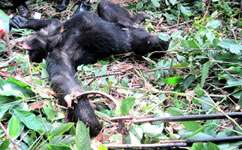Curiosity killed the ape

Recent research has brought to light the illegal practice of using mantraps to catch chimps in Uganda.
Dr Matt McLennan and colleagues have been studying great apes living around the Budongo Forest for the past six years. They recently published an article in Oryx, after repeated reports of chimpanzees being caught in mantraps.
Here, small patches of trees are interspersed with crop-filled fields. As animals move between bits of remaining forest, they can trample and eat the produce which lies between. These crops represent the livelihoods of local people.
Losing produce to raiding animals can mean serious financial losses. In a country where the average wage is equivalent to about $6 a week, the prospect of losing any income, is not welcome. So some farmers are using illegal measures to stop the animals. Instead of chasing them away, they are resorting to mantraps.
Farmers use these 2 feet wide steel-jaw traps in the hope of catching the offenders, normally bush pigs or baboons, which are considered vermin. But sadly, endangered chimpanzees are sometimes caught in the traps' vicious jaws instead, causing severe injuries and even death. Once case study reported a trapped chimp that eventually escaped, but left its severed foot behind.
The sweet-toothed apes are at risk because of their fondness for two cash crops grown in the area; sugarcane and bananas. Dr McLennan, lead author of the article, says: 'There is every reason to believe that these traps are a significant cause of mortality for chimps in this region.'
The traps are illegal so it is hard for researchers to find out how many chimps are caught each year. 'The cases we know about probably represent the tip of the iceberg,' states McLennan. The traps are used covertly, despite being openly for sale in many markets, and farmers are reluctant to discuss their use.
'People are aware they can get into trouble for trapping chimps,' McLennan goes on: 'There was one case where a chimp was caught but the owner of the trap disappeared that day and didn't return for two months'.
Failure to report trapped chimps can make the situation worse, since the earlier a trapped chimp is reported the sooner vets can attend, and save its life. Throughout the 4 year study, of the ten cases reported, seven victims recovered with veterinary aid. The research team learnt of the other three too late, and the animals died.
The Ugandan wildlife authorities and conservation groups have already done a lot of work against the use of snares – loops of iron wire which spring shut around an animal's neck or leg - by hunters to catch bush meat. But, laws against mantraps are not enforced.
The problem of snares has now been tackled through an innovative carrot-over-stick approach - hunters who stopped using them received two goats to farm as a reward. McLennan hopes this tactic can provide a blueprint for a similar approach to discourage farmers from using mantraps.
He fears that if the government were to come down harshly on individuals who use the mantraps, without addressing farmers' concerns, it would have the opposite effect. 'People say to me if you don't want us using the traps then what are you going to do about animals damaging our crops.' McLennan says. 'They want compensation. Obviously you can't compensate hundreds of farmers.'
Other methods to protect crops such as barbed-wire fences, or using chilli paste as a natural deterrent have been tested on a small scale by various researchers. But farmers need support in order to change their habits and adopt these new practices.
McLennan suggests integrating these conservation ideas with conservation strategies already in place in the region, such as tree planting and with rewards for famers who take action to protect chimps.
More information: McLennan, M. et al. Chimpanzees in mantraps: lethal crop protection and conservation in Uganda. Oryx, 46, pp 598-603. doi:10.1017/S0030605312000592.
Provided by PlanetEarth Online
This story is republished courtesy of Planet Earth online, a free, companion website to the award-winning magazine Planet Earth published and funded by the Natural Environment Research Council (NERC).


















